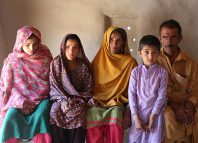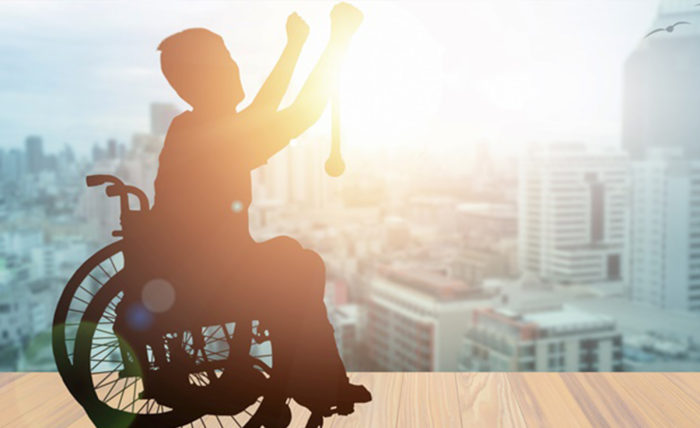COVID-19 does not discriminate: No Respite to People with disabilities
Siddique suffers a financial blow
It was agonizing for William Siddique to borrow money from someone to keep his little grocery shop operational and restocked. He had never felt the need to do that before since his shop had always been running successfully, providing him a comfortable income. That is of course, before the coronavirus outbreak hit Pakistan.
Thirty-four years old Siddique lives in Latifabad, which is a housing community that mostly homes the religious minority communities in Hyderabad city of Sindh province. Siddique’s lower limbs were afflicted with polio just months after his birth.
“From a very young age I have lived a difficult life as I felt worthless due to my physically disorder. However, things changed when I started running my own shop in 2012. I was earning a good living for myself. This independency restored my sense of being,” said Siddique.
Ever since the COVID-19 spread rapidly in the country and a lockdown was imposed, the shop has been running low on supplies and Siddique has had insufficient resources to restock the shop.
“The government has eased the lockdown now and shops have started to re-open, following protective protocols. I had to borrow PKR 40,000 (Approx. USD 249) to purchase the most popularly bought products to restock in my shop. I now have to worry about repaying this debt.”
Siddique walks on his hands due to his disability and rarely uses a wheelchair when going out.
“I enjoyed my time in the shop as some friendly customers would spend some time chatting with me. Also, my friends took me for outings and rides on their bikes which felt really good. We have not been able to do anything of that due to the lockdown.”
Siddique’s father, Shafiq Masih, works at the Hyderabad Municipal Corporation as a sanitation worker while his mother Anayatan Bibi, works as a domestic helper in some houses in Hyderabad city.
“In the last 10 months, the Corporation has not paid wages to sanitation workers, which is why we have been in a financial crunch. Moreover, my mother also lost her job as three of the houses that my mom worked at asked her to stop coming due to the lockdown. She has not been paid since then either.”
When Siddique was 14 years old he got admission at Hayat-e-Nau (New Life), a Rehabilitation Centre for Disabled Children located nearby.
“The Centre spent two years teaching me survival skills, including how to read and write and how to interact with people,” Siddique recalls fondly.
In this case, Siddique has been lucky since not every person with disability is fortunate enough to get such an opportunity. The National Policy for Disabled Persons was formulated in 2002 and a National Plan of Action (NPA) in 2006. However, that has still not been able to ensure the education and employment of many people with disabilities in the country.
Visually impaired, Zain Khan, struggles with social distancing and online-learning
Considering the implications of COVID-19, social distancing for people with disability, especially for the blind, like 24-year old Zain Khan, has presented a whole new set of challenges. Khan is a rights activist, a student, and a TV show host on the web-based channel UrduPoint.com. Belonging to Bahawalpur and studying MSc in Development Studies at the University of the Punjab’s Lahore campus, Khan is frequently traveling hundreds of miles between the cities.
“I have traveled to many cities and countries on my own. I move around independently but sometimes I need someone to accompany me,” shares Khan. “However, with the current scenario, implementing social distancing in practice is becoming a big challenge for me.”
The youngest of three brothers, Khan’s father passed away few months before his birth. His mother and two brothers have raised him with utmost love and care. He is smartly using a talking software on his touchscreen phone and Job Access with Speech (JAWS) for the laptop.
“The Brail language is useful during school but at college and university level we use technologies like JAWS to provide us help. During the lockdown, it is difficult to communicate in the same way.”
On his own, Khan is actively engaged in private, non-governmental initiatives for disabled people. Pakistan Para-climbing Club and School of Inclusion are two such institutes that he is part of.
“In June, there was a meeting of youth leaders in Sweden and I was to participate in it. But now the program is being conducted through online webinars. Also, my university has started online classes. The JAWS software helps a lot but seems technology yet needs to improve further and people like me need to be even more tech-savvy after the outbreak of coronavirus.”
The Masih siblings survive a lonely lockdown without a means of income
Only four kilometers away from Siddique’s shop is St. Paul Christian Colony in Hyderabad. This is also an urban slum similar to Latifabad. Here live siblings, Shabana Bibi, 30-year-old and her brother Saleem Masih, 20 years. The two siblings are suffering a different kind of challenge than Khan and Siddique.
Shabana was physically impaired due to active polio at the age of 2 years and Saleem started experiencing mental health challenges around the time he completed high school. Shabana and Saleem live alone in their house as their mother passed away ten years ago, followed by their father three years later. Their father worked as a sanitation worker at the Hyderabad Municipal Corporation. Their other three siblings live separately in their own houses.
“I used to sew clothes to make some money but now my eyesight has gone weak and I cannot carry on with this work. Our only income now is my father’s pension of 10,000 rupees (roughly US $65) a month but since this lockdown, I have not been able to go to the bank,” Shabana shares. “I don’t let my brother go out alone. Even when there is a need to buy something, I go along with him. So, I could not send him to the bank either.”
The Sindh government had been very active in managing COVID-19. Although there were reservations about the lack of provision of food to the poorest communities amidst the lockdown. In mid-April, the St. Francis Xavier Cathedral of Hyderabad had a food distribution in the area.
“We survived with the food assistance from the church; otherwise, we would have starved to death by now,” shared Shabana.
Shabana and Saleem are currently living alone in complete quarantine due to the lockdown.
“Other family members used to visit us almost every week but due to the lockdown, my brother and I are left almost alone because no one comes to meet us now.”







